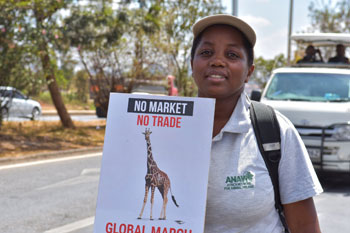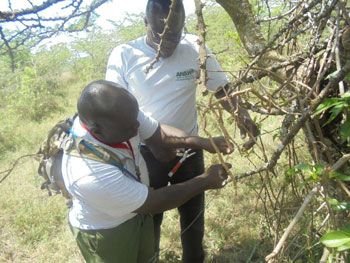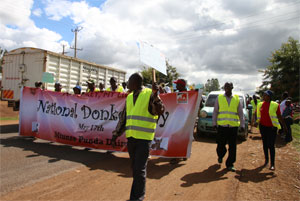Animal Welfare Updates - July 2019
Thousands of Conservationists Flood Nairobi Streets for This Year’s Global March
 On April 13, 2019, ANAW joined over 20 other conservation organizations in this year’s Global March for Elephants, Rhinos, Lions (GMFERL) and other endangered species celebrations dubbed, ‘No Market, No Trade’ flagged off by Kenya’s Cabinet Secretary for Tourism and Wildlife, Hon NajibBalala at the National Museums of Kenya! . On April 13, 2019, ANAW joined over 20 other conservation organizations in this year’s Global March for Elephants, Rhinos, Lions (GMFERL) and other endangered species celebrations dubbed, ‘No Market, No Trade’ flagged off by Kenya’s Cabinet Secretary for Tourism and Wildlife, Hon NajibBalala at the National Museums of Kenya! .
A jaw-dropping number of Kenyans numbering over 3,500 came out on that chilly morning to protest the killings and express their love and pride for wildlife in Kenya. After the flag-off, the enthusiastic celebrants took to the streets with banners stretched and placards lifted high to march from the National Museums of Kenya through the Nairobi Central Business District (CBD) to Kenya Wildlife Service (KWS) Headquarters which was the official event’s venue.
The event was central to ANAW, as the communications team was active online updating the public on the happenings and highlighting wildlife conservation and animal welfare issues being addressed by the theme of the day: No Market, No Trade. The team, in a designated exhibition booth, had a chance to meet and interact with participants. Many expressed their interests in knowing more about what it entails to look out for the welfare of endangered species and other works that ANAW was engaged in.
Global March for Elephants, Rhinos and Lions (GMFERL) is organized every year in hundreds of cities across the globe. This year the march was organized in 100 cities, among them Nairobi.
Despite the beauty that the African continent beholds, the numbers of elephant species have been dwindled at an alarming speed in the last decade. only a quarter of the number of what it was, stands today. Each year, approximately 35,000 are killed to meet the demand of ivory worldwide. In the same breath, only 23,000 lions roam what is left of their home today.
|
Biting Drought Leaves Wildlife Dead
 Since February this year, drought has continued to wreak havoc in many parts of Kenya and negatively affecting not only humans but also animals. As a team from ANAW who had gone for a routine de-snaring expedition in the expansive Soysambu Conservancy in Nakuru County,would later find out; 2 fresh carcasses of zebras suspected to have died from the ranging drought in the country. Since February this year, drought has continued to wreak havoc in many parts of Kenya and negatively affecting not only humans but also animals. As a team from ANAW who had gone for a routine de-snaring expedition in the expansive Soysambu Conservancy in Nakuru County,would later find out; 2 fresh carcasses of zebras suspected to have died from the ranging drought in the country.
Another carcass also lay fresh with an injury on the shoulder and suspected to have died of Septicaemia. Septicaemia, also known as sepsis, is a potentially life-threatening infection in which large amounts of bacteria are present in the blood. It is commonly referred to as blood poisoning. The open wound which was caused by a wire snarehad not been attended to for some time, and seemed to have precipitated the infection.
The exercise which happened between 23rd and 27th April 2019 saw the team lift 117 wire snares, (71 live snares and 46 of dead snares). Further, it was evident that the drought had caused a lot of movement for the wildlife as they looked for fresh grass and water hence many animals moving beyond the loosely fenced perimeters of the ranch and ending up in the hands of bushmeat poachers who are almost always on standby to feast on any stray animal from the conservancy.
|
ANAW Joins the World in Celebrating Donkey Welfare
 The dusty town of Wang’uru, in Kirinyaga County was at standstill on May 17, 2019 as ANAW joined donkey owners, other animal welfare organizations, National and County governments andthousands of Wang’uru and its environs’ dwellers to celebrate this year’s World Donkey Day,Kenyan chapter dubbed, ‘My Donkey; My life’. The dusty town of Wang’uru, in Kirinyaga County was at standstill on May 17, 2019 as ANAW joined donkey owners, other animal welfare organizations, National and County governments andthousands of Wang’uru and its environs’ dwellers to celebrate this year’s World Donkey Day,Kenyan chapter dubbed, ‘My Donkey; My life’.
The event that swept the sleepy town, started with a procession from Mwea’s Mosque and led by a local band formed a queue which snaked almost a kilometer, through the town, as song and dance in praise of the donkey reverberated the skywaves and ended at Wang’uru Stadium, the event’s official venue.
World Donkey Dayis celebrated to show respect for one of the most enduring and respectable animals in the Equidae family. Throughout history, it has served all over the world as both a mount and a beast of burden in some of the most challenging terrains and forbidding climates and has done so with pride and endurance. It is unsurprising that these beasts’ success is due in part, to their stubborn nature, and World Donkey Day honors them for this, along with their other, perhaps more laudable, traits.
ANAW having been at the forefront fighting for donkey welfare especially on endingthe wanton donkey slaughter and its subsequent skin trade was included in the programme of the day. “The compelling reason for donkey slaughter in Kenya is not its meat but its skin, for export to China.They use the skin to make a traditional medicine called ‘ejiao’ which they claim to be an anti-aging agent as well as libido booster in men” Josiah Ojwang, ANAW’s Director of Programs told the celebrants.
“15 years ago, China had a population of 11milliondonkeys, but they now have a partly 4.5million of remaining. Having wiped out their donkeys, Chinese traders have now turned to Africa to meet the demand for donkey skin, in Kenya they are behind the four operational donkeyabattoirs that slaughter almost 1000 donkeys a day. If Kenya does not wake up and smell the coffee, its donkey population, which is estimated to be less than a million now, will get depleted in the next few years.” He added.
Mr. Ojwang added that the burgeoning market for donkey hides in China had fueled massive theft of the animal causing untold suffering to the communities that solely depend on donkeys for their livelihoods hence urging all the donkey owners present to be extra vigilant and ensure their donkeys are kept healthy and safe.
Kirinyaga County Director of veterinary Services, Dr Richard Gichangi, who was the chief guest emphasized the dire need of donkey owners to closely monitor the welfare of the animal and ensure the handlers, who in most cases are not the owners, donot mistreat the animal in anyway.
|
Leave a Legacy of Compassion for Animals.
Here’s a great way to support Africa Network for Animal Welfare (ANAW) and enable us to protect future generations of animals. By putting a bequest to ANAW in your will or trust, you will help us to improve the lives of animals far beyond your lifetime.
Contact Josphat Ngonyo at This email address is being protected from spambots. You need JavaScript enabled to view it. if you need additional information about how to include us in your will.
You can also support our work by donating online through our secure online platform. Please, click on the donate button below to submit a donation.

|